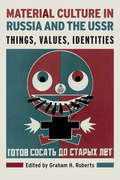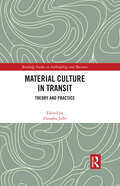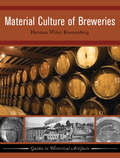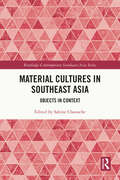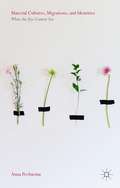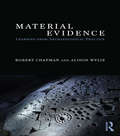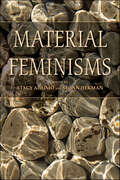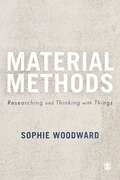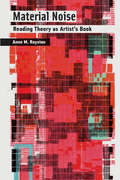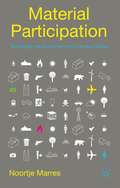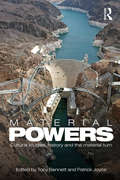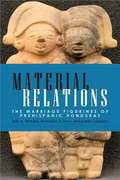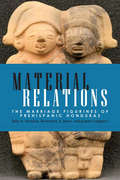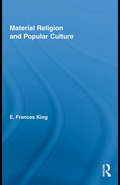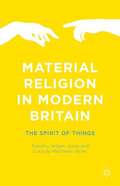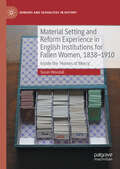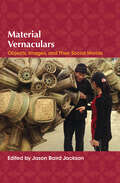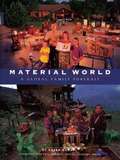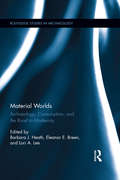- Table View
- List View
Material Culture in Russia and the USSR: Things, Values, Identities
by Graham H. RobertsMaterial Culture in Russia and the USSR comprises some of the most cutting-edge scholarship across anthropology, history and material and cultural studies relating to Russia and the Soviet Union, from Peter the Great to Putin.Material culture in Russia and the USSR holds a particularly important role, as the distinction between private and public spheres has at times developed in radically different ways than in many places in the more commonly studied West. With case studies covering alcohol, fashion, cinema, advertising and photography among other topics, this wide-ranging collection offers an unparalleled survey of material culture in Russia and the USSR and addresses core questions such as: what makes Russian and Soviet material culture distinctive; who produces it; what values it portrays; and how it relates to 'high culture' and consumer culture.
Material Culture in Transit: Theory and Practice (Routledge Studies in Anthropology and Museums)
by Zainabu JalloMaterial Culture in Transit: Theory and Practice constellates curators and scholars actively working with material culture within academic and museal institutions through theory and practice. The rich collection of essays critically addresses the multivalent ways in which mobility reshapes the characteristics of artefacts, specifically under prevailing issues of representation and colonial liabilities. The volume attests to material culture as central to understanding the repercussions of problematic histories and proposes novel ways to address them. It is valuable reading for scholars of anthropology, museum studies, history and others with an interest in material culture.
Material Culture of Breweries (Guides To Historical Artifacts Ser. #2)
by Herman Wiley RonnenbergFrom antique bottles to closely guarded recipes and treasured historic architecture, breweries have a special place in American history. This fascinating book brings the material culture of breweries in the United States to life, from many regions of the country and from early 16th century production to today’s industrial operations. Herman Ronnenberg traces the evolution of techniques, equipment, raw materials, and architecture over five centuries, discusses informal production outside of breweries, and offers detailed information on makers marks, patents, labels, and beer containers that allows readers to identify items in their own collections. Heavily illustrated with photographs and line drawings, this book will be popular with collectors and general readers, and a key reference in historical archaeology, local history, material culture, and related fields.
Material Culture, Power, and Identity in Ancient China
by Xiaolong WuIn this book, Xiaolong Wu offers a comprehensive and in-depth study of the Zhongshan state during China's Warring States Period (476-221 BCE). Analyzing artefacts, inscriptions, and grandiose funerary structures within a broad archaeological context, he illuminates the connections between power and identity, and the role of material culture in asserting and communicating both. The author brings an interdisciplinary approach to this study. He combines and cross-examines all available categories of evidence, including archaeological, textual, art historical, and epigraphical, enabling innovative interpretations and conclusions that challenge conventional views regarding Zhongshan and ethnicity in ancient China. Wu reveals the complex relationship between material culture, cultural identity, and statecraft intended by the royal patrons. He demonstrates that the Zhongshan king Cuo constructed a hybrid cultural identity, consolidated his power, and aimed to maintain political order at court after his death through the buildings, sculpture, and inscriptions that he commissioned.
Material Cultures in Southeast Asia: Objects in Context (Routledge Contemporary Southeast Asia Series)
by Sabine ChaoucheThis book investigates everyday objects in Southeast Asia as integral forms of cultural heritage, examining their functions, significance, and the diverse values and emotions they have embodied over time.By foregrounding material culture, the chapters delve into how these objects—ranging from utilitarian tools to artefacts of personal and communal identity—reveal the social, economic, and cultural dimensions of life across different historical periods. Through rigorous case studies spanning various regions of Southeast Asia, the book offers fresh insights into the interplay between materiality and cultures. It underscores how objects function not merely as remnants of the past but as dynamic carriers of heritage that continue to shape contemporary society. By bridging perspectives from anthropology, history, and cultural studies, this book enhances our comprehension of the region’s intricate social landscapes and contributes to broader discourses on heritage preservation and curation, the transmission of cultural values, and the ways in which everyday objects serve as conduits for collective memory and identity. Ultimately, it facilitates the de-centring of Western perspectives in research on Southeast Asia.Material Cultures in Southeast Asia provides a better understanding of past and present societies in Southeast Asia, and it will be of interest to researchers in the fields of Southeast Asian studies, memory studies, and heritage studies.
Material Cultures, Migrations, and Identities: What the Eye Cannot See
by Anna PechurinaFocusing on the experiences of Russian migrants to the United Kingdom, this book explores the connection between migrations, homes and identities. It evaluates several approaches to studying them, and is structured around a series of case studies on attitudes to homemaking, food and cooking, and clothing.
Material Cultures: Why Some Things Matter (Materializing Culture Ser. #5)
by Daniel MillerThis volume is an ethnographic study of material cultures. Incorporating local and global dimensions, a team of scholars explore the changing experiences of cultures in locations as disparate as the Philippines and Northern Ireland. Material culture and consumption studies have undergone something of a renaissance recently. This study provides an up-to-date analysis of a developing field in sociological and anthropological based courses.; This book is intended for undergraduate/MA courses on material culture and consumption within cultural studies and anthropology degree schemes.
Material Evidence: Learning from Archaeological Practice
by Alison Wylie Robert ChapmanHow do archaeologists make effective use of physical traces and material culture as repositories of evidence? Material Evidence takes a resolutely case-based approach to this question, exploring instances of exemplary practice, key challenges, instructive failures, and innovative developments in the use of archaeological data as evidence. The goal is to bring to the surface the wisdom of practice, teasing out norms of archaeological reasoning from evidence. Archaeologists make compelling use of an enormously diverse range of material evidence, from garbage dumps to monuments, from finely crafted artifacts rich with cultural significance to the detritus of everyday life and the inadvertent transformation of landscapes over the long term. Each contributor to Material Evidence identifies a particular type of evidence with which they grapple and considers, with reference to concrete examples, how archaeologists construct evidential claims, critically assess them, and bring them to bear on pivotal questions about the cultural past. Historians, cultural anthropologists, philosophers, and science studies scholars are increasingly interested in working with material things as objects of inquiry and as evidence – and they acknowledge on all sides just how challenging this is. One of the central messages of the book is that close analysis of archaeological best practice can yield constructive guidelines for practice that have much to offer archaeologists and those in related fields.
Material Feminisms
by Stacy Alaimo & Susan HekmanHarnessing the energy of provocative theories generated by recent understandings of the human body, the natural world, and the material world, Material Feminisms presents an entirely new way for feminists to conceive of the question of materiality. In lively and timely essays, an international group of feminist thinkers challenges the assumptions and norms that have previously defined studies about the body. These wide-ranging essays grapple with topics such as the material reality of race, the significance of sexual difference, the impact of disability experience, and the complex interaction between nature and culture in traumatic events such as Hurricane Katrina. By insisting on the importance of materiality, this volume breaks new ground in philosophy, feminist theory, cultural studies, science studies, and other fields where the body and nature collide.
Material Girls: Why Reality Matters for Feminism
by Kathleen Stock'A clear, concise, easy-to-read account of the issues between sex, gender and feminism . . . an important book' Evening Standard'A call for cool heads at a time of great heat and a vital reminder that revolutions don't always end well' Sunday Times Material Girls is a timely and trenchant critique of the influential theory that we all have an inner feeling known as a gender identity, and that this feeling is more socially significant than our biological sex.Professor Kathleen Stock surveys the philosophical ideas that led to this point, and closely interrogates each one, from De Beauvoir's statement that, 'One is not born, but rather becomes a woman' (an assertion she contends has been misinterpreted and repurposed), to Judith Butler's claim that language creates biological reality, rather than describing it. She looks at biological sex in a range of important contexts, including women-only spaces and resources, healthcare, epidemiology, political organization and data collection.Material Girls makes a clear, humane and feminist case for our retaining the ability to discuss reality, and concludes with a positive vision for the future, in which trans rights activists and feminists can collaborate to achieve some of their political aims.
Material Girls: Why Reality Matters for Feminism
by Kathleen Stock'A clear, concise, easy-to-read account of the issues between sex, gender and feminism . . . an important book' Evening Standard 'A call for cool heads at a time of great heat and a vital reminder that revolutions don't always end well' Sunday Times Material Girls is a timely and trenchant critique of the influential theory that we all have an inner feeling known as a gender identity, and that this feeling is more socially significant than our biological sex.Professor Kathleen Stock surveys the philosophical ideas that led to this point, and closely interrogates each one, from De Beauvoir's statement that, 'One is not born, but rather becomes a woman' (an assertion she contends has been misinterpreted and repurposed), to Judith Butler's claim that language creates biological reality, rather than describing it. She looks at biological sex in a range of important contexts, including women-only spaces and resources, healthcare, epidemiology, political organization and data collection.Material Girls makes a clear, humane and feminist case for our retaining the ability to discuss reality, and concludes with a positive vision for the future, in which trans rights activists and feminists can collaborate to achieve some of their political aims.
Material Girls: Why Reality Matters for Feminism
by Kathleen Stock'A clear, concise, easy-to-read account of the issues between sex, gender and feminism . . . an important book' Evening Standard 'A call for cool heads at a time of great heat and a vital reminder that revolutions don't always end well' Sunday Times Material Girls is a timely and trenchant critique of the influential theory that we all have an inner feeling known as a gender identity, and that this feeling is more socially significant than our biological sex.Professor Kathleen Stock surveys the philosophical ideas that led to this point, and closely interrogates each one, from De Beauvoir's statement that, 'One is not born, but rather becomes a woman' (an assertion she contends has been misinterpreted and repurposed), to Judith Butler's claim that language creates biological reality, rather than describing it. She looks at biological sex in a range of important contexts, including women-only spaces and resources, healthcare, epidemiology, political organization and data collection.Material Girls makes a clear, humane and feminist case for our retaining the ability to discuss reality, and concludes with a positive vision for the future, in which trans rights activists and feminists can collaborate to achieve some of their political aims.
Material Methods: Researching and Thinking with Things
by Sophie WoodwardMaterial Methods brings together resources for researchers investigating both the material, as well as the social world through material objects we design, buy, make, exchange and collect. It covers the whole research process, from theoretical underpinnings, selection of methods and their possible uses, as well as representing and analysing data. It introduces students and researchers to the wide range of cross-disciplinary methods which help us to approach and interpret material culture and materials. The book also provides students and researchers with the tools to critically reflect upon pre-existing methods to see their limitations as well as possibilities, and apply them to their own research practice.
Material Methods: Researching and Thinking with Things
by Sophie WoodwardMaterial Methods brings together resources for researchers investigating both the material, as well as the social world through material objects we design, buy, make, exchange and collect. It covers the whole research process, from theoretical underpinnings, selection of methods and their possible uses, as well as representing and analysing data. It introduces students and researchers to the wide range of cross-disciplinary methods which help us to approach and interpret material culture and materials. The book also provides students and researchers with the tools to critically reflect upon pre-existing methods to see their limitations as well as possibilities, and apply them to their own research practice.
Material Noise: Reading Theory as Artist's Book
by Anne M. RoystonAn argument that theoretical works can signify through their materiality—their “noise,” or such nonsemantic elements as typography—as well as their semantic content. In Material Noise, Anne Royston argues that theoretical works signify through their materiality—such nonsemantic elements as typography or color—as well as their semantic content. Examining works by Jacques Derrida, Avital Ronell, Georges Bataille, and other well-known theorists, Royston considers their materiality and design—which she terms “noise”—as integral to their meaning. In other words, she reads these theoretical works as complex assemblages, just as she would read an artist's book in all its idiosyncratic tangibility. Royston explores the formlessness and heterogeneity of the Encyclopedia Da Costa, which published works by Bataille, André Breton, and others; the use of layout and white space in Derrida's Glas; the typographic illegibility—“static and interference”—in Ronell's The Telephone Book; and the enticing surfaces of Mark C. Taylor's Hiding, its digital counterpart The Réal: Las Vegas, NV, and Shelley Jackson's Skin. Royston then extends her analysis to other genres, examining two recent artists' books that express explicit theoretical concerns: Johanna Drucker's Stochastic Poetics and Susan Howe's Tom Tit Tot.Throughout, Royston develops the concept of artistic arguments, which employ signification that exceeds the semantics of a printed text and are not reducible to a series of linear logical propositions. Artistic arguments foreground their materiality and reflect on the media that create them. Moreover, Royston argues, each artistic argument anticipates some aspect of digital thinking, speaking directly to such contemporary concerns as hypertext, communication theory, networks, and digital distribution.
Material Participation
by Noortje MarresThis book develops a fresh perspective on everyday forms of engagement, one that foregrounds the role of objects, technologies and settings in democracy. Examining a range of devices, from smart meters to eco-homes, the book sets out new concepts and methods for analyzing the relations between participation, innovation and the environment.
Material Powers: Cultural Studies, History and the Material Turn (CRESC)
by Tony Bennett Patrick JoyceThis edited collection is a major contribution to the current development of a ‘material turn’ in the social sciences and humanities. It does so by exploring new understandings of how power is made up and exercised by examining the role of material infrastructures in the organization of state power and the role of material cultural practices in the organization of colonial forms of governance. A diverse range of historical examples is drawn on in illustrating these concerns – from the role of territorial engineering projects in seventeenth-century France through the development of the postal system in nineteenth-century Britain to the relations between the state and road-building in contemporary Peru, for example. The colonial contexts examined are similarly varied, ranging from the role of photographic practices in the constitution of colonial power in India and the measurement of the bodies of the colonized in French colonial practices to the part played by the relations between museums and expeditions in the organization of Australian forms of colonial rule. These specific concerns are connected to major critical re-examination of the limits of the earlier formulations of cultural materialism and the logic of the ‘cultural turn’. The collection brings together a group of key international scholars whose work has played a leading role in debates in and across the fields of history, visual culture studies, anthropology, geography, cultural studies, museum studies, and literary studies.
Material Relations
by Julia A. Hendon Rosemary A. Joyce Jeanne LopiparoFocusing on marriage figurines--double human figurines that represent relations formed through social alliances--Hendon, Joyce, and Lopiparo examine the material relations created in Honduras between AD 500 and 1000, a period of time when a network of social houses linked settlements of a variety of sizes in the region. The authors analyze these small, seemingly insignificant artifacts using the theory of materiality to understand broader social processes. They examine the production, use, and disposal of marriage figurines from six sites--Campo Dos, Cerro Palenque, Copán, Currusté, Tenampua, and Travesia--and explore their role in rituals and ceremonies, as well as in the forming of social bonds and the celebration of relationships among communities. They find evidence of historical traditions reproduced over generations through material media in social relations among individuals, families, and communities, as well as social differences within this network of connected yet independent settlements. Material Relations provides a new and dynamic understanding of how social houses functioned via networks of production and reciprocal exchange of material objects and will be of interest to Mesoamerican archaeologists, anthropologists, and art historians.
Material Relations: The Marriage Figurines of Prehispanic Honduras
by Julia A. Hendon Rosemary A. Joyce Jeanne LopiparoFocusing on marriage figurines—double human figurines that represent relations formed through social alliances—Hendon, Joyce, and Lopiparo examine the material relations created in Honduras between AD 500 and 1000, a period of time when a network of social houses linked settlements of a variety of sizes in the region. The authors analyze these small, seemingly insignificant artifacts using the theory of materiality to understand broader social processes. They examine the production, use, and disposal of marriage figurines from six sites—Campo Dos, Cerro Palenque, Copán, Currusté, Tenampua, and Travesia—and explore their role in rituals and ceremonies, as well as in the forming of social bonds and the celebration of relationships among communities. They find evidence of historical traditions reproduced over generations through material media in social relations among individuals, families, and communities, as well as social differences within this network of connected yet independent settlements. Material Relations provides a new and dynamic understanding of how social houses functioned via networks of production and reciprocal exchange of material objects and will be of interest to Mesoamerican archaeologists, anthropologists, and art historians.
Material Religion and Popular Culture (Routledge Studies in Religion)
by E. Frances KingIn this study, E. Frances King explores how people first learn to relate to the images and artefacts of religious belief within their domestic environments. As a sense of religious belonging is instilled on a daily basis in the home, it also becomes emotionally linked to family, community, and homeland, resulting in two different genealogies – one to do with faith and one to do with motherland – that become entangled.
Material Religion in Modern Britain
by Timothy Willem Jones Lucinda Matthews-JonesA growing awareness of religious plurality and religious conflict in contemporary society has led to a search for new ways to understand religious change beyond traditional subjects of British ecclesiology. Narratives of the gradual decline of Christianity dominate this field; yet many scholars now concede that Britain's religious landscape was more varied and rich than these narratives would suggest. Material Religion in Modern Britain responds to this challenge by bringing emerging scholarship on material culture to bear on studies of religion and spirituality. The collection is the first to apply this suite of analytical methods to the traditional subjects of British religious studies and the full spectrum of religious denominations, sects, and movements that constituted Britain's multi-faith landscape in the nineteenth and twentieth centuries. The book reveals how, across this religious spectrum, objects were, and continue to be, used in the performance and production of religious faith and subjectivity. In doing so it expands our understanding of the persistence of religious belief and culture in a secularising, secularized, and post-secular society.
Material Setting and Reform Experience in English Institutions for Fallen Women, 1838-1910: Inside the ‘Homes of Mercy’ (Genders and Sexualities in History)
by Susan WoodallTracing the history of four English case studies, this book explores how, from outward appearance to interior furnishings, the material worlds of reform institutions for ‘fallen’ women reflected their moral purpose and shaped the lived experience of their inmates. Variously known as asylums, refuges, magdalens, penitentiaries, Houses or Homes of Mercy, the goal of such institutions was the moral ‘rehabilitation’ of unmarried but sexually experienced ‘fallen’ women. Largely from the working-classes, such women – some of whom had been sex workers – were represented in contradictory terms. Morally tainted and a potential threat to respectable family life, they were also worthy of pity and in need of ‘saving’ from further sin. Fuelled by rising prostitution rates, from the early decades of the nineteenth century the number of moral reform institutions for ‘fallen’ women expanded across Britain and Ireland. Through a programme of laundry, sewing work and regular religious instruction, the period of institutionalisation and moral re-education of around two years was designed to bring about a change in behaviour, readying inmates for economic self-sufficiency and re-entry into society in respectable domestic service. To achieve their goal, institutional authorities deployed an array of ritual, material, religious and disciplinary tools, with mixed results.
Material Vernaculars: Objects, Images, and Their Social Worlds (Material Vernaculars Ser.)
by Jason Baird JacksonThe role of objects and images in everyday life are illuminated incisively in Material Vernaculars, which combines historical, ethnographic, and object-based methods across a diverse range of material and visual cultural forms. The contributors to this volume offer revealing insights into the significance of such practices as scrapbooking, folk art produced by the elderly, the wedding coat in Osage ceremonial exchanges, temporary huts built during the Jewish festival of Sukkot, and Kiowa women's traditional roles in raiding and warfare. While emphasizing local vernacular culture, the contributors point to the ways that culture is put to social ends within larger social networks and within the stream of history. While attending to the material world, these case studies explicate the manner in which the tangible and intangible, the material and the meaningful, are constantly entwined and co-constituted.
Material World: A Global Family Portrait
by Charles C. Mann Peter MenzelWe are witnessing the emergence of a unified world economy, as exemplified by NAFTA and GATT, that will, in theory, make goods available at cheaper prices, and create new jobs throughout the world.
Material Worlds: Archaeology, Consumption, and the Road to Modernity (Routledge Studies in Archaeology)
by Barbara J. Heath Eleanor E. Breen Lori A. LeeMaterial Worlds examines consumption from an archaeological perspective, broadly exploring the intersection of social relations and objects through the processes of production, distribution, use, reuse, and discard. Interrogating individual objects as well as considering the contexts in which acts of consumption take place, a range of case studies present the intertwined issues of power, inequality, identity, and community as mediated through choice, access, and use of the diversity of mass-produced goods. Key themes of this innovative volume include the relationship between colonial, political and economic structures and the practices of consumption, the use of consumer goods in the construction and negotiation of identity, and the dialectic between strategies of consumption and individual or community choices. Situating studies of consumerism within the field of historical archaeology, this exciting collection reflects on the interrelationship between the material and ideological aspects of culture. With a focus on North America from the seventeenth through the early twentieth centuries, Material Worlds is an important examination of consumption which will appeal to scholars with interests in colonialism, gender and race, as well as those engaged with the material culture of the emergent modern world.
